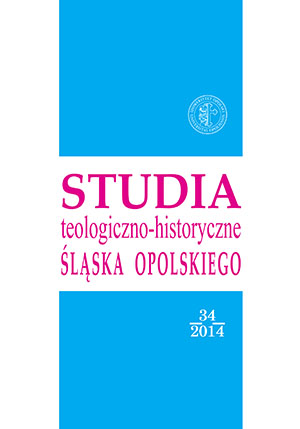Tito všichni, které pozval uvedený Jošt
All of Those, Who Were Invited by the aforementioned Jost.
. The Importance of Wrocław and Bishop Jodocus of Rosenberg in the Strengthening of the Catholic Opposition Against King George of Poděbrady (1465-1466). A polemical Study
Author(s): Bogusław CzechowiczSubject(s): History of Church(es), Diplomatic history, Political history, 17th Century
Published by: Uniwersytet Opolski
Keywords: George of Poděbrady; Confederacy of Zelená Hora; Jost von Rosenberg; Zdenek von Sternberg; Matthias Corvinus
Summary/Abstract: Studies of the Catholic opposition against the Bohemian King George of Poděbrady have focused so far on the role of either Wrocław or the Confederacy of Zelená Hora set up by Catholic Bohemian lords on 28 November 1465. What these two groups had in common (from 1465 to Jodocus’ death in 1467) was the figure of Jodocus of Rosenberg, who was both the Bishop of Wrocław and a member of a powerful noble family from South Bohemia. The extensive analysis of source materials unambiguously suggests that he was the instigator of the Confederacy of Zelená Hora. He was very active on the territory of the Kingdom of Bohemia in 1465. According to most of the Czech (Bohemocentric) literature, the Confederacy, which had the support of the Pope and the Emperor, was lead by another Bohemian noble, Zdenek of Sternberg. However, the historical sources quoted extensively in the article indicate that until his death Jodok was the leading figure of the movement. His prominent role was respected even by Protasius of Boskowice, the Bishop of Olomouc. One of the reasons the Confederacy was created was the fact that the Bohemian lords felt threatened by the city of Wrocław. The capital of Silesia had rejected King George since the beginning of his reign (1458), claiming that the city had a right to participate in the decisionmaking about who ascended the Bohemian throne. Thereby Wrocław challenged the privileges of the Bohemian nobility granted by the Holy Roman Emperor Frederick II in the Golden Bull of Sicily (1212), which gave the Bohemian gentry a right to elect their king. Therefore, the Confederacy of Zelená Hora was an attempt to strengthen the position of Bohemian lords in the Bohemian Crown not only against the king, who marginalised them, but also against Wrocław, which was becoming too politically independent. In this way, the Confederacy seems to be a part of the traditional antagonism between gentry and towns. However, the confederates were forced to cooperate with Wrocław for the sake of the common good — the rejection of the heretic king George of Poděbrady, whom the Pope deposed in December 1466, releasing his subjects from their oaths of allegiance. In the end, Wrocław forced through the Hungarian ruler, Matthias Corvinus, as the candidate for the Bohemian antiking; while the option promoted by the Confederacy — the candidacy of the Polish king Casimir Jagiellon or one of his sons — foundered. At that time, Bishop Jodocus’ position began to weaken. He was one of the last supporters of a compromise with the king, while both Wrocław and the Confederacy were getting more and more determined to provoke an armed confrontation with King George. The king himself had no choice at this point and had to use force to exact obedience. Jodocus lived long enough to see the defeat of the Wrocław army at the battle of Ząbkowice Śląskie in 1467 but he died in December of the same year. Unpopular in both Bohemia (where he was deemed a traitor to the national interest) and Silesia (as a Bohemian, he was perceived as the king’s man, even though he opposed George), he has been marginalised in historiography.
Journal: Studia Teologiczno-Historyczne Śląska Opolskiego
- Issue Year: 34/2014
- Issue No: _
- Page Range: 179-206
- Page Count: 28
- Language: Polish

